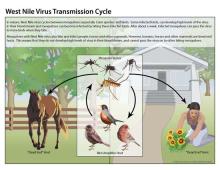West Nile Virus (WNV)
West Nile Virus in Alexandria
West Nile can be found in mosquitoes beginning in July or very early August.
Transmission Cycle
West Nile Virus is passed regularly between birds and mosquitoes.
- An infected bird is bitten by a mosquito
- The mosquito picks up the virus from the bird
- The infected mosquito feeds on an uninfected bird; the virus is passed to the bird and the WNV cycle continues.
- Sometimes, the infected mosquito will feed on humans or horses. Some of these humans and horses can get sick or die from the infection.

Signs and Symptoms
Symptoms usually appear three to fifteen days after a person is bitten by an infected mosquito. Approximately 80% of people who are infected with WNV will not feel sick.
Mild symptoms: Up to 20% of the people infected with WNV develop WNV fever. Symptoms may include fever, headache, body aches, nausea, vomiting, and sometimes swollen lymph glands or a skin rash on the chest, stomach, and/or back. Symptoms may last for a few days to several weeks.
Serious symptoms: About one in 150 people develop severe illness. This may include high fever, headache, neck stiffness, stupor, disorientation, coma, tremors, convulsions, muscle weakness, vision loss, numbness, or paralysis. These symptoms may last several weeks and neurological effects may be permanent. West Nile virus infection can be fatal.
Contact Us
Vector-Borne Illness Prevention Program
Alexandria Health Department
4480 King Street, 3rd Floor
Alexandria, VA 22302
Phone: 703.746.4910
Hours: 8 a.m. to 4:30 p.m. (M,Tu,W,F) and 1:30 p.m. to 4:30 p.m. (Th)
Resources
- CDC's West Nile virus website: www.cdc.gov/ncidod/dvbid/westnile/index.htm